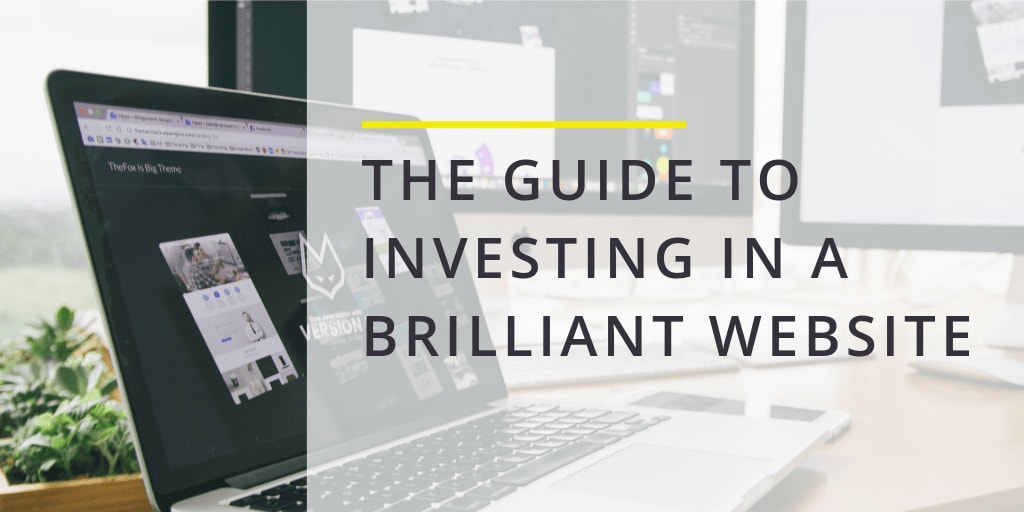June 8, 2016
The Guide to Investing in a Brilliant Website

There are multiple benefits of hosting and maintaining a website for your organisation. From providing an online customer experience, to exploring new digital opportunities, to being an efficient communications platform, websites are certainly a go-to for leading brands, and for some big reasons. Here are a few:
Establish Credibility – Having presence online confirms that your business indeed exists. Further, the information on your website will allow your audience to know more about your business (e.g. credentials, history, team, etc). It is also an avenue whereby you can establish your business as a market leader or expert in its field.
Online Visibility – Once your website is up and running, it becomes visible and searchable to an infinite number of audience. Thus, it gives you an opportunity to reach people who you would otherwise not cross paths with.
Accessibility – Websites run 24/7. This means that the service you provide via your website does not sleep and therefore can attend to more people. This is particularly important to those that do their research and shopping outside of business hours.
Cost-efficient Marketing – There are many ways in which to draw people to your website, and many of these methods do not cost a pretty penny such as Search Engine Optimisation and Pay-per-click Advertising. Moreover, exposure can be increased through the use of social media accounts by linking social posts to your website.
Sales Opportunity – More website visits lead to potential sales. With the above-mentioned cost-efficient marketing options coupled with techniques to drive traffic to your site can lead to sales.
Economical – Having a website can save you money that you would otherwise need to use for mailing and printing. A website is like a brochure, except it is virtual. Customers will no longer have to talk to a Sales Representative for long periods of time to get the information they need. Downloadable forms, which customers would otherwise have to pick up or that you would have to mail can be made available on the website.
Now that you are probably convinced to invest in a website, here are a few things involved in owning a website that you need to know and consider:
Web Hosting – Owning a website is similar to owning a store in that you need space to park your website and all its information, albeit virtually. Web hosts provide individuals or businesses space on a server, which is either owned or leased by the individual or business and provide Internet connectivity which then allows the website to be accessible through the World Wide Web. The cost of web hosting varies from the type of web hosting availed. For example, having a dedicated server is considerably more expensive that availing of a shared service (meaning you share the “space” with other businesses). For small businesses, web host providers typically charge a monthly or yearly fee depending on factors such as the amount of storage space needed, the number of required email accounts, as well as related building tools. A basic web hosting service can go as low as $4 a month.
Licensing fees – You want your website to be visually appealing to your audience. To do this, you will need to use photos. For small businesses who do not want to spend a fortune on photo shoots, an option is to pay for use of photos by professional providers. In cases where website owners want to have music on their website and don’t want to pay for an original composition, they can turn to music providers for ready-music they can use in return of a fee.
Content Management System (CMS) – Not all websites come with a built-in CMS however it is advantageous to a small business owner with some computer knowledge to invest in in this. A CMS is a software that allows the website owner to adjust the contents of a website. With out this, the website owner will have to rely on the website developer for any change to the website, no matter how small. There is a cost associated to maintaining and updating a website through the website developer that can actually be avoided if the website is created with a CMS. Some examples of CMS include WordPress, Joomla and Magento.
Now, once you have your website up and running, here are some things that you need to keep in mind to ensure the best results from your website.
Track performance – One of the main goals of a website is to increase conversions. Conversions in this aspect refers to an action taken by your audience on your website such as downloading and filling up of forms, subscribing to your newsletter or ordering a product. To see the performance of your website overtime, it is important to track its progress towards the goal. Google Analytics is a free tool that can help you track the activity on your site and will help you evaluate decisions regarding any changes you need or want to make.
Review bi-annually – Advances in technology affect the mindset and behavior people and the way they use the web. What can be working then might no longer work now. To determine if any changes are necessary based on the data you have gathered from tracking your goals for the website, it is recommended that you review your website performance and its components at least bi-annually.
Nowadays, to be able to compete in the marketplace and for a business to thrive, having a website is necessary and has many benefits. To maximise the benefits though, it is advisable for a business owner to invest in a CMS, monitor the performance of the website regularly and have review the website bi-annually to check for issues and ways to improve it.
Tags: Digital Strategy, Website Best Practice, Website Development, Website Improvement
